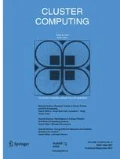Abstract
In order to optimize supply chain scheduling problem in mass customization mode, the mathematical programming of supply chain scheduling optimization problem is modelled. At the same time, model mapping is defined as a directed graph to facilitate the application of intelligent search algorithms. In addition, the features of genetic algorithm and particle swarm algorithm are introduced. Genetic algorithm has a strong global search capability, and particle swarm optimization algorithm has fast convergence speed. Therefore, the two algorithms are combined to construct a hybrid algorithm. Finally, the hybrid algorithm is used to solve the supply chain optimization scheduling problem model. Compared with other algorithms, the results show that the hybrid algorithm has better performance. The mathematical programming model used in this paper can be further extended and improved.








Similar content being viewed by others
References
Sun, J., Wu, X., Palade, V., et al.: Random drift particle swarm optimization algorithm: convergence analysis and parameter selection. Mach. Learn. 101(1–3), 345–376 (2015)
Cheng, R., Jin, Y.: A social learning particle swarm optimization algorithm for scalable optimization. Inf. Sci. 291(6), 43–60 (2015)
Esmin, A.A.A., Coelho, R.A., Matwin, S.: A review on particle swarm optimization algorithm and its variants to clustering high-dimensional data. Artif. Intell. Rev. 44(1), 23–45 (2015)
Tanweer, M.R., Suresh, S., Sundararajan, N.: Self regulating particle swarm optimization algorithm. Inf. Sci. 294(10), 182–202 (2015)
Zhang, L., Tang, Y., Hua, C., et al.: A new particle swarm optimization algorithm with adaptive inertia weight based on Bayesian techniques [J]. Appl. Soft Comput. 28(C), 138–149 (2015)
Chen, Z., Xiong, R., Wang, K., et al.: Optimal energy management strategy of a plug-in hybrid electric vehicle based on a particle swarm optimization algorithm. Energies 8(5), 3661–3678 (2015)
Hou, P., Hu, W., Soltani, M., et al.: Optimized placement of wind turbines in large-scale offshore wind farm using particle swarm optimization algorithm. IEEE Trans. Sustain. Energy 6(4), 1272–1282 (2015)
Sun, C., Jin, Y., Zeng, J., et al.: A two-layer surrogate-assisted particle swarm optimization algorithm. Soft. Comput. 19(6), 1461–1475 (2015)
Marinakis, Y.: An improved particle swarm optimization algorithm for the capacitated location routing problem and for the location routing problem with stochastic demands [J]. Appl. Soft Comput. 37(C), 680–701 (2015)
Maolong, X.I., Xiaojun, W.U., Fang, W., et al.: Quantum-behaved particle swarm optimization algorithm with self-renewal mechanism. Comput. Eng. Appl. 2(10), 100–114 (2015)
Turgut, O.E.: Hybrid chaotic quantum behaved particle swarm optimization algorithm for thermal design of plate fin heat exchangers. Appl. Math. Model. 40(1), 50–69 (2016)
Xia, L.R., Run-Xue, L.I., Liu, Q.Y., et al.: An adaptive multi-objective particle swarm optimization algorithm based on dynamic AHP and its application. Control Decis. 30(2), 15–221 (2015)
Van, M., Kang, H.J.: Wavelet kernel local fisher discriminant analysis with particle swarm optimization algorithm for bearing defect classification. IEEE Trans. Instrum. Meas. 64(12), 3588–3600 (2015)
Kong, Z., Jia, W., Zhang, G., et al.: Normal parameter reduction in soft set based on particle swarm optimization algorithm. Appl. Math. Model. 39(16), 4808–4820 (2015)
Kora, P., Krishna, K.S.R.: Hybrid firefly and particle swarm optimization algorithm for the detection of bundle branch block. Int. J. Cardiovasc. Acad. 2(1), 44–48 (2016)
Lu, Y., Zeng, N., Liu, Y., et al.: A hybrid wavelet neural network and switching particle swarm optimization algorithm for face direction recognition. Neurocomputing 155(C), 219–224 (2015)
Huang, K.W., Chen, J.L., Yang, C.S., et al.: A memetic particle swarm optimization algorithm for solving the DNA fragment assembly problem. Neural Comput. Appl. 26(3), 495–506 (2015)
Izadi, H., Effatnejad, R.: Power system stabilizers and control of reactive power compensator in multi-machine by particle swarm optimization algorithm. Indian J. Sci. Technol. 8(3), 254 (2015)
Acknowledgements
The authors acknowledge the National Natural Science Foundation of China (Grant: 111578109), the National Natural Science Foundation of China (Grant: 11111121005).
Funding
Funding was provided by National Natural Science Foundation Project (Grant No. 71701213).
Author information
Authors and Affiliations
Corresponding author
Rights and permissions
About this article
Cite this article
Xiong, F., Gong, P., Jin, P. et al. Supply chain scheduling optimization based on genetic particle swarm optimization algorithm. Cluster Comput 22 (Suppl 6), 14767–14775 (2019). https://doi.org/10.1007/s10586-018-2400-z
Received:
Revised:
Accepted:
Published:
Issue Date:
DOI: https://doi.org/10.1007/s10586-018-2400-z




